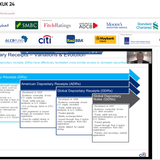Argentine confectioner Arcor is looking to refinance its 7.25% senior unsecured notes due in 2017 with US$350mn in new debt at IPTs of 6.25%. Construction firm CLISA kicks off its global roadshow today ahead of a potential dollar bond issuance in early July.
Celulosa Argentina is said to be planning a US$250mn 7-year bond while YPF, the Argentine oil company, has announced a peso-linked 4-year dollar denominated bond and Petrobras Argentina prepares an issuance of up to US$500mn.
At the same time, Argentina's Province of Salta announced up to US$350mn in senior unsecured notes, and earlier this week the national government announced it will tap the markets with 12 and 20-year notes equivalent to roughly US$2.75bn to fund a buyback – a move that comes just months after its landmark US$16.5bn bond sale, a deal that effectively reopened the country’s markets.
Those deals are set to follow a number of issuances from some of the country’s strongest corporates and quasi sovereigns including pay-TV and broadband provider Cablevision S.A., local mortgage lender Banco Hipotecario, Argentine real estate firm IRSA and several provinces including Chubut, Córdoba, and Neuquen.
“Argentina has been on a screamer since Macri got in and investors have been waiting for an opportunity to play the story,” said Sam Bevan, a credit research analyst at Aberdeen Asset Management.
Despite tightening spreads, and despite trading at a slight premium by many accounts, investors continue to pile into the country’s debt. The drive for Argentine corporates is partly driven by technicals and partly fundamentals, investors suggest.
“For corporates, the issuers that have come to date have been market leaders in their fields – Cablevision, Arcor, IRSA – and have deserved ratings far in excess of what the sovereign ceiling prevents. For example, Moody’s gave Arcor a standalone rating of ‘Baa3’.”
“They are still offering a pick-up over LatAm counterparts given the quality of company you are buying. This is even more attractive when compared to CEE, Middle East and Asia. One thing to note is the best Argentine corporates trade very tight to the sovereign, which isn’t commonplace elsewhere but reflects the quality of these names and the shortage of paper,” he added.
Argentine corporates and banks have US$3.9bn of external public debt and US$5.7bn of loans maturing until the end of 2016, and Olga Fedotova, Head of Emerging Markets Credit research at AXA IM believes we could see at least US$5bn of issuance from Argentine corporates over the coming months.
“The energy and the FI sectors have been the traditional issuers in Argentina, and we expect new demand coming from the consumer sector as well,” she said.
“They do not have significant foreign debt, overall they are not very leveraged, and they offer a lucrative premium over the sovereign – which has already issued US$19bn YTD, and potentially might come back to the market by the end of this year.”
“In the environment of yield hunting, combined with a potential upgrade, Argentine corporates might be the ‘next Brazil’,” she said.
Some investors disagree, and point to the fairly low ceiling set by the sovereign’s credit rating as one of the key reasons why. Moody’s gives the sovereign a ‘B3’ rating with stable outlook, while Standard & Poor’s raised it to ‘B-’ from selective default in May this year, which some believe artificially makes some of the country’s credits more expensive.
Brigitte Posch, Babson Capital Management’s Head of EM Corporate Debt said her fund is comfortable on select Argentine corporates that demonstrate solid balance sheets, low leverage, good liquidity and the ability to weather FX volatility, but that currently, their notes don’t offer the attractive pickup to Argentina’s sovereign bonds when compared to the spread pickup over the respective sovereigns of their EM peers.
For instance, Arcor’s US$350mn issuance this week priced 25bp shy of its IPTs and just 20bp wider than the interpolated sovereign spread curve, and tighter than its Argentine corporate peers.
“While the standalone fundamentals of the company are very strong, it is not possible to totally separate the company from the sovereign given that profits are predominantly coming from Argentina and also considering their exposure to the Argentine peso,” Posch said.
“It is important to note that if those Argentine companies were located outside of Argentina, their credit ratings could be much higher and these companies would look cheap to their EM peers,” she said, adding that Argentine corporates also tend to see higher secondary market volatility relative to their EM peers which is driven largely by sentiment towards the sovereign.
Politics still looms large
Another investor that spoke with Bonds & Loans warned that while the “turnaround story is clearly a positive thing for the country’s market, many are discounting the very serious challenges still facing the country.”
Inflation, still sailing at over 30%, is worrying despite the country’s longstanding experience in managing it; the Central Bank has in recent weeks cut the key benchmark rate and the interest paid on shorter-term Lebacs.
The government is in the process of shaping controversial labour and anti-corruption legislation that isn’t seeing the same degree of bi-partisan support as earlier economic reforms had.
“There is still a chance politics could get bitter, particularly as we get further and further away from last year’s election, which could derail many of the gains made and cause investors to get antsy.”
Some investors have also voiced concerns on the fiscal front, particularly over the country’s recently passed tax amnesty bill, which offers amnesty to residents holding hundreds of billions of dollars in undeclared funds outside the country.
The funds, largely parked in offshore safe havens, will pay between 0 and 15% in taxes depending on the amount declared when brought back into the country, and will help the government support pensioners, mirroring a similar policy move introduced by Chile last year.
A new bill, which was sent to congress for approval last month, also looks to expand payments to over 2.5 million retirees by an average of 20%, or ARS75bn.
“Macri’s standing, legislatively, is reasonably weak. He is still focused on his performance in the 2017 mid-term elections, which could also explain why the fiscal target is where it is,” said Thomas Christiansen, who co-manages Nordea Asset Management’s Emerging Hard Currency Bond Fund.
“The country is still technically in a recession, which makes Macri’s high approval rating remarkable – and he will want to keep it that way until the mid-term elections come around, which could mean favouring more achievable fiscal targets and tempering his ambition in a sense.”
Nevertheless, from a global standpoint, Argentina is still one of the places in the EM universe that continues to tell a strong positive story from the bottom up.
“We’ve seen more downgrades than upgrades over the last year, consolidation of power in Turkey under Erdogan, severe political uncertainty in South Africa and more recently the violence in Tshwane, a negative fiscal story in Brazil to name a few,” Christiansen said. “Argentina stands out because its trajectory is still positive.”
In any event, with a slew of issuances on the horizon it will be interesting to track whether the market gets “full” of the risk.
“Market issuance has been slow this year and behind expectations. Add on top of these a wall of maturities and the technical bid from the market has been pretty good. New issues from decent names have generally been able to build decent books and print at decent levels,” Bevan concluded, suggesting the market could easily digest more Argie paper.









